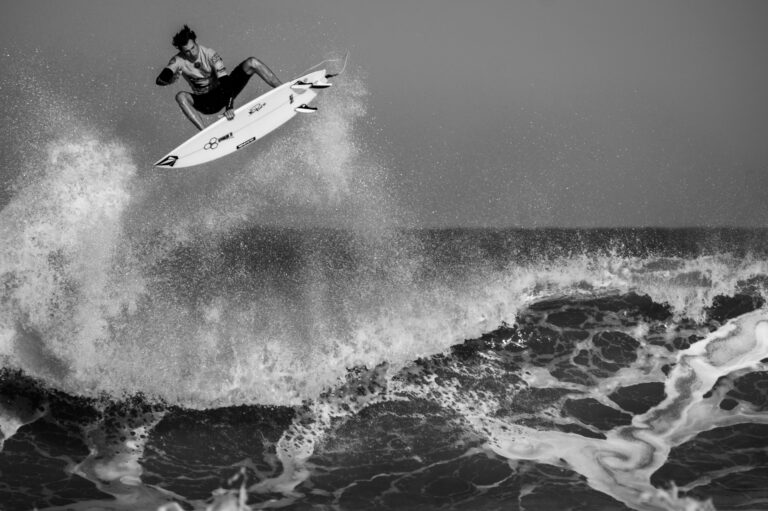The ocean has long been a muse for philosophers, artists, and adventurers alike. Its vastness, unpredictability, and beauty draw us in, inviting us to explore both its depths and its surface. For surfers, the ocean becomes more than just a body of water—it becomes a playground, a sanctuary, and a teacher. In this blog post, we will explore the profound philosophical lessons that can be gleaned from the act of surfing, delving into themes of presence, adaptability, interconnectedness, and the relentless pursuit of balance. Just as every wave is unique, so too are the insights we can gain from riding them. So, wax up your board and join us as we ride the waves of surfing philosophy.
Presence in the Moment
Embracing the essence of being fully present while riding waves is not just a skill; it’s a necessity for both safety and enjoyment. When you’re out on the water, every moment counts, and being fully attuned to the present is crucial.
The Importance of Mindfulness
Mindfulness is the cornerstone of being present in the moment while surfing. It involves a deliberate focus on the sensations, sounds, and movements happening in the here and now. By tuning out distractions and quieting the mind, surfers can enhance their connection with each wave.
Enhancing Performance
Being present in the moment isn’t just about safety—it also significantly impacts performance. When surfers are fully engaged with the present wave, they can make split-second decisions, adjust their balance, and react to changing conditions more effectively. This heightened focus often leads to better maneuvers, smoother rides, and an overall more enjoyable experience.
Cultivating Gratitude
Surfing offers a unique opportunity to connect with nature and appreciate the beauty of the ocean. By embracing the ephemeral nature of each wave, surfers can cultivate a sense of gratitude for the present moment. Whether it’s a perfect barrel or a gentle ripple, every wave is a gift to be cherished.
Finding Flow
In the world of surfing, there’s a concept known as “flow”—a state of total immersion and energized focus in an activity. Achieving flow requires being fully present in the moment, letting go of past mistakes and future worries, and allowing oneself to become one with the rhythm of the waves. When surfers enter this state, they experience a profound sense of joy and fulfillment.
Connecting with the Elements
Surfing is a deeply elemental experience, where the surfer becomes one with the water, wind, and sun. By embracing the present moment, riders can forge a deeper connection with these natural elements, enhancing their overall sense of well-being and harmony.
A Practice in Acceptance
Riding waves teaches us to accept things as they are, without judgment or resistance. Each wave is unique, with its own challenges and opportunities. By letting go of expectations and surrendering to the present moment, surfers can find peace and serenity amidst the chaos of the ocean.

Adaptability and Resilience
Surfers are masters of adaptability and resilience, constantly responding to the ever-changing conditions of the ocean with grace and skill. These qualities not only make them better surfers but also valuable lessons for navigating life’s challenges.
Embracing Change
One of the fundamental principles of surfing is learning to embrace change. From shifting tides to varying wave heights, surfers must adapt their approach on the fly. This ability to adjust to new circumstances serves as a valuable reminder that change is inevitable and can often lead to growth and new opportunities.
Navigating Challenges
Surfing is not without its challenges, from wipeouts to getting caught in a rip current. However, every setback presents an opportunity for learning and growth. By staying calm under pressure and persevering through difficult situations, surfers develop resilience that extends far beyond the waves.
Finding Strength in Flexibility
Flexibility is key to success in surfing, both in a physical and mental sense. Surfers must be flexible in their bodies to maneuver on the board and adapt to the dynamic nature of the waves. Similarly, they must also be mentally flexible, willing to let go of expectations and go with the flow.
Building Confidence
Navigating the uncertainties of the ocean builds confidence in surfers, knowing that they can handle whatever challenges come their way. This sense of self-assurance carries over into other areas of life, empowering individuals to tackle obstacles with courage and determination.
Embracing Resilience
Resilience is the ability to bounce back from adversity stronger than before. Surfers develop resilience through countless hours of practice, facing wipeouts, and overcoming fears. This resilience serves them well both on and off the waves, enabling them to persevere through life’s ups and downs.
Learning from Setbacks
Setbacks are inevitable in surfing, whether it’s missing a wave or experiencing a bad wipeout. However, each setback offers valuable lessons that help surfers improve their skills and become better riders. By reframing setbacks as opportunities for growth, surfers can turn adversity into strength.
Interconnectedness
Surfers often speak of a profound sense of interconnectedness with the ocean, recognizing that their relationship with the sea is symbiotic and deeply intertwined. This understanding shapes not only their approach to surfing but also their attitudes towards environmental stewardship and respect for marine ecosystems.
Symbiotic Relationship
Surfers understand that they are not separate from the ocean but rather an integral part of it. They rely on the waves for recreation and enjoyment, while the ocean, in turn, provides the energy and dynamics that make surfing possible. This mutual dependence fosters a sense of respect and reverence for the natural world.
Ripple Effects of Actions
Every action we take has a ripple effect, impacting the delicate balance of the marine environment. Surfers are acutely aware of this interconnectedness and strive to minimize their ecological footprint both in and out of the water. Whether it’s reducing plastic waste or supporting conservation efforts, surfers recognize the importance of individual responsibility in preserving the health of the ocean.
Cultivating Stewardship
Surfing instills a sense of stewardship for the ocean, inspiring surfers to become advocates for marine conservation and protection. Many surfers actively participate in beach cleanups, restoration projects, and educational initiatives to raise awareness about environmental issues. By cultivating a culture of stewardship within the surfing community, individuals can contribute to the long-term sustainability of coastal ecosystems.
Respect for Nature
Respect is at the core of surfing culture, extending not only to fellow surfers but also to the natural world. Surfers approach the ocean with humility and reverence, recognizing its power and unpredictability. This respect for nature translates into mindful behavior in the lineup, such as giving right of way to other surfers and avoiding disruptive activities that harm marine life.
Environmental Advocacy
Surfers are uniquely positioned to advocate for environmental conservation, given their close connection to the ocean. Many professional surfers use their platform to raise awareness about pressing issues such as climate change, overfishing, and pollution. By leveraging their influence, surfers can amplify the message of sustainability and inspire positive change on a global scale.
Promoting Sustainable Practices
As ambassadors of the ocean, surfers play a crucial role in promoting sustainable practices both on and off the waves. This includes supporting eco-friendly surfboard materials, reducing carbon emissions associated with travel, and advocating for policies that protect coastal habitats. By making conscious choices that prioritize the health of the planet, surfers can help ensure a brighter future for generations to come.
VIDEO CREDITS ALINAS WORLD
FAQs
Q. What is the connection between surfing and philosophy?
A. Surfing and philosophy intersect in various ways, such as the deep connection with nature, the pursuit of flow states, the acceptance of impermanence, and the lessons learned from overcoming challenges.
Q. How does surfing connect with the concept of flow?
A. Surfing often involves entering a flow state, where the surfer becomes fully immersed in the activity, losing track of time and ego. This parallels philosophical ideas of being in the moment and experiencing pure existence.
Q. What can surfing teach us about resilience?
A. Surfing teaches resilience by requiring surfers to face the unpredictability of waves, endure wipeouts, and persistently paddle back out after setbacks. These experiences translate to resilience in facing life’s challenges.
Q. How does surfing relate to environmental ethics?
A. Surfing fosters a deep connection with the ocean, making surfers more attuned to environmental issues such as pollution and climate change. This connection often leads to a sense of responsibility and activism for protecting marine ecosystems.
Q. In what ways does surfing embody the philosophy of “going with the flow”?
A. Surfing involves adapting to constantly changing conditions, such as wave patterns, tides, and weather. Surfers learn to go with the flow by adjusting their approach to match the rhythm of the ocean, rather than trying to control it.



